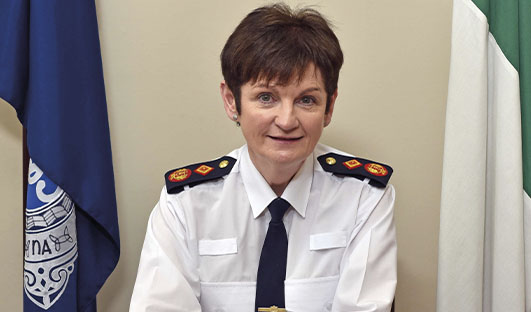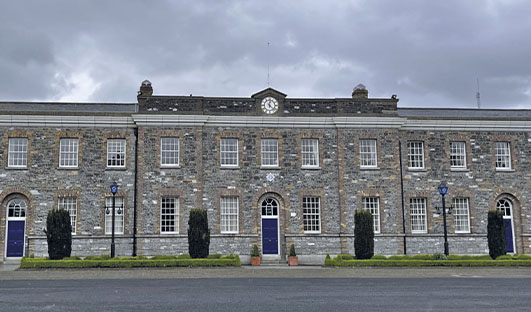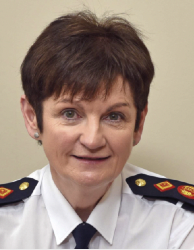Deputy Commissioner McMahon: Garda centenary an opportunity for reflection

Deputy Commissioner for Policing and Security, Anne Marie McMahon, talks to Ciarán Galway about the opportunity for An Garda Síochána to reflect in its centenary year and its pursuit of continuous improvement.
“An Garda Síochána has evolved into an organisation that we are all very proud of,” McMahon begins, adding: “The centenary is significant in that it not only offers us the opportunity to take stock of how far we have come but also to assess the values which have got us to this point, as well as ensuring that these are embedded in future service delivery, while acknowledging mistakes and using that learning as we endeavour to become a better police service.”
Upon the foundation of An Garda Síochána in 1922, the first Garda Commissioner, Michael Staines, articulated an ethos, which McMahon explains, remains at the organisation’s core: “An Garda Síochána will succeed, not by force of arms or numbers, but on its moral authority as servants of the people.”
Holding to this central ethos, even as the organisation has adapted and reformed to changing environments over the decades, McMahon believes, has ensured that An Garda Síochána retains one of the highest public trust levels for a police service in the world.
This, she says, was emphasised during the Covid-19 pandemic when its front-facing and community-focused services became “an anchor” for communities and individuals across the country.
Having first served as a garda in 1986, the Deputy Commissioner is well-placed to remark on the pace of change within the organisation. In 2020, McMahon was appointed Acting Deputy Commissioner and assigned to oversee Governance and Strategy before being formally appointed to the role – which also incorporated performance – the following year. In 2021, she was subsequently assigned the Policing and Security brief.
Female representation
Indeed, having prevented women from joining until 1959, An Garda Síochána now boasts one of the highest proportions of female police officers in Europe, at just under 30 per cent.
McMahon is a personification of this change, occupying one of the two Deputy Commissioner roles in An Garda Síochána, both of which are currently held by females.
“The gender diversity that is now evident in the organisation did not materialise overnight. It is a result of more and more young females joining An Garda Síochána and going forward for promotion over the past 60 years. The female perspective is different, and it is important that we reflect that perspective in our units, in our management, including at strategic level,” she says.
Highlighting that women now rightly occupy many senior positions in the organisation, as well as leading roles in specialist and operational units, McMahon asserts: “It is reflective of society and shows that we are leading the way when compared to our European counterparts.”
Highlighting a recent recruitment campaign, for which 11,000 applications were received, McMahon says that a 40 per cent female applicant rate, “speaks to the diversity and evolution of the Guards”.
Technology
Other significant patterns of change observed by McMahon include technology. While acknowledging that much work is still to be done in the digitalisation sphere, she says that relative to only a decade ago, incremental change has transformed the policing landscape.
“Equally, our systems and processes have improved immensely. While I am not suggesting they are perfect, over time we have got better at implementing our own systems, improving governance, and changing dramatically and immeasurably our governance landscape,” she adds.
Multifaceted role
With responsibility for policing and security, the Assistant Commissioners across the four regional boundaries – Southern, Eastern, North Western, and Dublin Metropolitan Region – are accountable to McMahon, as is the Garda National Crime and Security Intelligence Service; and the Organised and Serious Crime unit.

Outlining the priorities of such a dynamic role, McMahon says: “The security of the State is always a top priority. We are in a fortunate position that our security situation is very stable, but we do not take that for granted, especially in the current international context, and so it is a pressure point we ensure we are on top of.
“Organised crime is an ever-present and requires constant managing in our bid to stay ahead of the criminals. To do this we have forged strong relationships with our international partners, but that pandemic has brought around an increase in online and cybercrime, meaning we have had to pivot to meet that challenge by upskilling our people and our technology.”
Community policing
However, McMahon maintains that community policing, retaining close contact with communities, and maintaining current high satisfaction levels remains the top priority. Stressing that relationships with communities requires constant nurturing and cultivation, she adds: “As we reflect on the centenary, amidst much change, the words of Michael Staines remain as relevant today as they did 100 years ago and something we hold up as a constant priority.”
Reform
Community policing is central to the ongoing reform programme within An Garda Síochána, and McMahon says that the programme is inextricably linked to her remit of policing and security.
Pre-Covid, Garda Commissioner Drew Harris announced the introduction of the Garda Operating Model, aiming to recruit more frontline gardaí and placing a greater emphasis on community policing. Citing the operating model as an example of the pervasive impact of reform, McMahon says: “With an enlargement of the regions, of the vision and a move from a geographical, district structure to a functionality structure, there is an impact on resources, on governance, on technology, and so the reform programme is reflected in everything we do on a day-to-day basis.”
Vision
Looking ahead to the future and the significant challenges the organisation faces in the decades ahead. McMahon summarises: “The evolving nature of crime and criminality is always a challenge, and it is something we must always work to be ahead of because we know the impacts they have on communities and individuals.
“For me, the most important thing for An Garda Síochána is that it continues to provide a service that supports and protects people. As Deputy Commissioner, it is important for me that we continue to do that consistently at a strategic level.”
Concluding, the Deputy Commissioner adds: “This centenary year gives us an opportunity to not only look back but to look forward as well. We want to ensure that in those areas where we have served well, we carry those forward and seek to evolve and grow them with the appropriate resources, to deliver a service that meets the needs of the people.”
Profile:
Anne Marie McMahon
Deputy Commissioner, Policing and Security, Anne Marie McMahon is a County Clare native and joined An Garda  Síochána in 1986. Following a mission with the United Nations Transitional Authority in Cambodia (UNTAC), she was promoted to Sergeant in 1995, originally serving as instructor at the Student Probationer School, Garda College before serving as Operational/Community Policing Sergeant in Henry Street District, Limerick city, between 1997 and 2002. Between 2002 and 2016 she gained successive promotions, moving from Inspector through to Superintendent, Chief Superintendent and Assistant Commissioner. In 2020, McMahon was appointed Acting Deputy Commissioner and assigned Governance and Strategy before being formally appointed a year later and assigned Strategy, Governance and Performance. She took up her current post as Deputy Commissioner in February 2021.
Síochána in 1986. Following a mission with the United Nations Transitional Authority in Cambodia (UNTAC), she was promoted to Sergeant in 1995, originally serving as instructor at the Student Probationer School, Garda College before serving as Operational/Community Policing Sergeant in Henry Street District, Limerick city, between 1997 and 2002. Between 2002 and 2016 she gained successive promotions, moving from Inspector through to Superintendent, Chief Superintendent and Assistant Commissioner. In 2020, McMahon was appointed Acting Deputy Commissioner and assigned Governance and Strategy before being formally appointed a year later and assigned Strategy, Governance and Performance. She took up her current post as Deputy Commissioner in February 2021.





